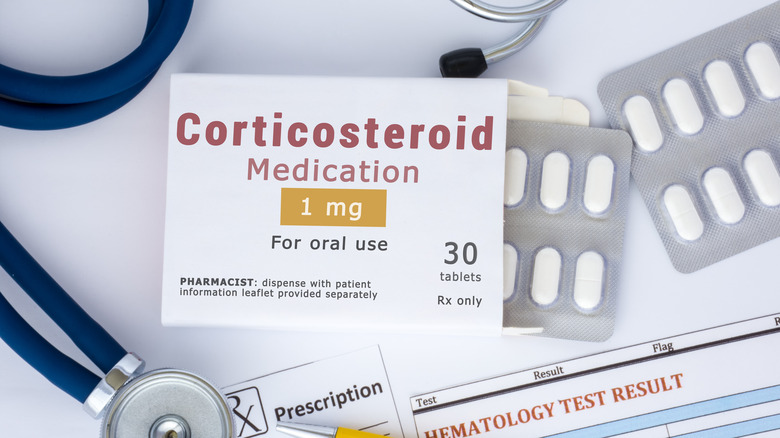Surprising Side Effects Of Taking Steroids
Corticosteroid drugs — such as cortisone, hydrocortisone and prednisone — are anti-inflammatories used to treat a variety of conditions including rashes, inflammatory diseases, allergies, and asthma (via Mayo Clinic). Corticosteroids can also suppress your immune system, and help to control conditions that cause your immune system to attack your own tissues by mistake. However, while taking steroids can do a lot of good, they also carry potential risks.
Depending on what you are having treated, steroids can be administered in various ways: by mouth, by inhaler or nasal spray, via eye drops, through creams or ointments, or by injection. According to the Mayo Clinic, the side effects can differ depending on which of these methods you use.
For instance, if you are taking steroids by mouth to help treat inflammation due to a chronic condition such as arthritis or lupus, side effects could include fluid retention, high blood pressure, issues with mood swings or memory, an upset stomach, or weight gain. If you take an oral steroid for longer periods, you could experience other side effects such as glaucoma, cataracts, osteoporosis, severe fatigue, and bruising, among other symptoms. Side effects from corticosteroid inhalers may include hoarseness or fungal infection within the mouth. When injected, corticosteroids can cause temporary pain or loss of skin color near the injection site, as well as facial flushing and insomnia.
Can side effects from taking steroids be reduced?
According to Cleveland Clinic, it is possible to minimize side effects from taking steroids by following some guidelines. First, use steroids only when absolutely necessary. The steroids should also be administered in the smallest viable dose, through a method as localized as possible for the problem being treated. Your doctor should keep an eye out for side effects such as bone density issues, and should also regularly monitor your blood pressure and blood sugar levels and treat as needed. Tt is important to keep an open dialogue with your doctor about any other side effects you may be experiencing during your steroid treatment so you can discuss how to address them.
While taking steroids poses risks, not everyone will experience side effects. Cleveland Clinic notes that if you only need steroid treatment for a few days up to a few weeks — or if you're being administered a steroid only occasionally — you may not experience any side effects at all. The longer you use steroids, the more likely you are to experience side effects, so you should only undergo prolonged use of steroids when you are suffering from an illness that is severe enough to justify this course of treatment.


